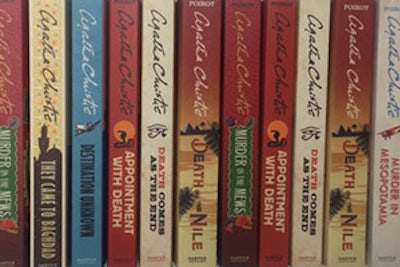
Frequently Asked Questions
1. When was the first time you realised that your grandmother was a famous writer? How did you feel about it?
Probably when I was at my first boarding school, aged about nine or ten. I don’t think it made much difference to me except she used to send me a nice copy of her new books, which impressed my school mates.
2. Next to being a famous writer, was she a grandmother like all others? In other words: a grandmother that spoiled you with extra care, sweets etc?
The short answer is yes! It helped that both my mother and I were only children, so her family instincts were concentrated on us. But she was kind, listened to all my stories, ambitions, watched me play cricket, took me to plays, music and the opera when I was older, and was very nice to my friends.
3. Is there a special memory that you like to share with Christie fans? Like the nice anecdotes you shared with us in your online blogs.
My grandmother loved flower decoration and once, with help of an Australian architect friend, made an entry in the local summer flower show. The judge wrote a very complimentary and enthusiastic report on the entry, saying it was the most original she had seen at the show for years, ending with the words “It is a shame then that we have to disqualify the entry as it is an inch too high!”
4. Did you read all your grandmother’s books? Do you have a favourite story or detective?
Yes. Probably Miss Marple and The Body in the Library – but I love Endless Night too. Of other writers my favourite is John Le Carré’s Smiley.
5. Can you explain why she disliked one of her most popular characters, Hercule Poirot?
Because she had so many ideas of different stories to write, not all of which were suitable for Poirot, but her publisher always wanted her to write Poirot stories, because they were the most popular. Even today, I think that some of the stories without Poirot or Marple in them are very underrated (except And Then There Were None, of course). Crooked House, Towards Zero, Endless Night and even Death Comes As the End, about ancient Egypt. Try them...
6. It appears you are more interested in modernisation and adaptation of your grandmother’s literary heritage than for instance your mother was. Please tell us a bit more about your personal viewpoints on this subject.
What I am interested in is the presentation of Agatha Christie to a modern audience. I freely admit that the most successful adaptations so far have been traditional ones, though I think one or two of the American Warner Bros films in the 1980s were underrated, particularly Murder is Easy. I do think Agatha Christie can occasionally be updated, but if it is to be done successfully both we and the producers and directors have to be really bold, along the lines of the BBC’s current Sherlock which you may not have seen yet.
7. What do you think about the films and series based on your grandmother’s stories?
They are hugely popular all over the world. David Suchet is a marvellous Poirot, and there have been several excellent Miss Marples, including the current one, Julia McKenzie. We haven’t made a really big feature film for years. I hope we do soon!
From an interview Mathew gave in 2010.
Read more about Family Memories

The Guessing Game
Christie's grandson recalls a memory of Agatha Christie reading the family A Pocket Full of Rye and everyone guessing who the murderer was.

Inspired by Travel
Mathew Prichard describes the inspiration Christie gained from travelling on the Orient Express.

Inspired by Archaeology
Mathew Prichard looks at Agatha Christie's novels that were inspired by her trips on archaeological digs.


 USA
USA 
